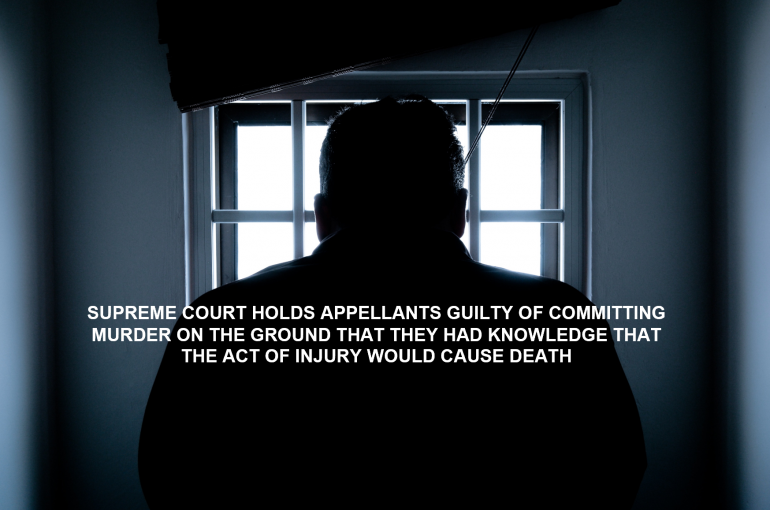SUPREME COURT HOLDS APPELLANTS GUILTY OF COMMITTING MURDER ON THE GROUND THAT THEY HAD KNOWLEDGE THAT THE ACT OF INJURY WOULD CAUSE DEATH
Recently, a two Judge Bench of the Supreme Court comprising of Justice S. Ravindra Bhat and Justice Krishna Murari passed a Judgment dated 24.01.2023 in Prasad Pradhan & Anr. vs. The State of Chhattisgarh in Criminal Appeal No. 2025 of 2022, and held the Appellants-Accused guilty of committing murder of the Deceased under Section 300 of the Indian Penal Code 1860 (IPC) (Murder) on the ground that although the Appellants-Accused did not have the intention to cause death of the Deceased, but they had knowledge that the act of causing injury would in all probability cause death.
FACTS
The State of Chhattisgarh prosecuted the Appellants-Accused, namely, Prasad Pradhan, Lingraj Pradhan and Soudagar Pradhan, in relation to an incident, leading to the death of one, Vrindawan. The Prosecution’s allegation was that the Appellant-Accused and Vrindawan, the Deceased, were cousins. On the afternoon of 28.02.2012, when the Deceased was getting his land levelled through a JCB machine, the Appellants reached the place and attacked him. Vrindawan sustained several injuries including head injuries. He was taken to the hospital and was examined by Dr. Bhageshwar Patel. As serious head injuries were involved, Vrindawan was operated upon by Dr. S.N. Madhariya. However, Vrindawan could not survive and died on 22.03.2012. Dr. S.K. Bagh conducted the post-mortem and, in his report, stated that the death was caused by injuries sustained by the Deceased on his head.
The Police registered a case under Section 302 IPC (Punishment for murder) read with Section 34 IPC (Acts done by several persons in furtherance of common intention) against all Accused persons, based on a First Information Report (FIR) lodged by one, Aarti Pradhan, the Deceased Vrindawan’s Daughter. The FIR alleged that the Appellants reached the spot, abused Vrindawan and then assaulted him. The allegation against the Accused- Prasad Pradhan was that he was armed with an axe and he attacked the Deceased on the head. Against Lingraj Pradhan, the allegation was that he was armed with an axe and he had assaulted the Deceased on the legs. Regarding the third Accused – Soudagar Pradhan, the allegation was that he went to the spot and caught hold of the Deceased.
After the Final Report was filed by the Police, the Trial Court charged all three Accused persons of sharing common intention and then committing the murder of Vrindawan; they were charged with commission of offences under Sections 294 IPC (Obscene acts and songs), 323 IPC (Punishment for voluntarily causing hurt) read with 34 IPC and 302 IPC read with 34 IPC. The Appellants were put to trial.
The Prosecution examined as many as 15 witnesses: Aarti Pradhan, Narrotam, Safed Pradhan, Rukni, Ayodhya Bai and Navin Sahu, who are all relatives of the Deceased. The Appellants examined two defense witnesses. The Trial Court held all the Appellants guilty of commission of the offence alleged against them and sentenced them to: life imprisonment, for the offence of murder, and six months rigorous imprisonment for the offence under Section 323 IPC.
The Appellants’ Appeal before the Chhattisgarh High Court was partly allowed vide Impugned Judgment dated 20.02.2019 in Cr. A. No. 178/2013. The High Court acquitted Soudagar Pradhan on both counts, but affirmed the conviction and sentence of the other two Accused- Prasad Pradhan and Lingraj Pradhan.
REASONING AND ANALYSIS
Aggrieved by the Judgement of the Chhattisgarh High Court, the Appellants moved the Supreme Court under Article 134 of the Constitution of India (Appellate jurisdiction of Supreme Court in regard to criminal matters).
The Apex Court relied on the Judgement of Santosh S/o. Shankar Pawar v. State of Maharashtra (2015) 7 SCC 641, wherein the Supreme Court observed as follows:
“13. Even assuming that the Accused had no intention to cause the death of the deceased, the act of the Accused falls under Clause Fourthly of Section 300 Indian Penal Code that is the act of causing injury so imminently dangerous where it will in all probability cause death. Any person of average intelligence would have the knowledge that pouring of kerosene and setting her on fire by throwing a lighted matchstick is so imminently dangerous that in all probability such an act would cause injuries causing death.”
In present case, the Apex Court observed as follows:
“No abstract standard of reasonableness can be laid down. What a reasonable man will do in certain circumstances depends upon the customs, manners, way of life, traditional values etc.; in short, the cultural, social and emotional background of the society to which an Accused belongs. In our vast country there are social groups ranging from the lowest to the highest state of civilization. It is neither possible nor desirable to lay down any standard with precision: it is for the court to decide in each case, having regard to the relevant circumstances.”
CONCLUSION
Thus, the Apex Court in the present case held that (1) the Appellants, who were in the adjacent property, climbed the wall, entered the Deceased’s house, and attacked him with axes, (2) hence, the said facts do not constitute a “sudden quarrel” amongst the Accused and the Deceased, (3) given that the Appellants abused the Deceased in an unprovoked manner, and (4) then they went to the place where the Deceased was located, armed with axes, and assaulted him. (5) Further, it was not clear whether the Deceased said anything to the Appellants which triggered their ire, leading to loss of self-control so as to result in “grave and sudden provocation”. Such provocation, if any, was not brought to the attention of the Court by the Appellants. Hence, based on the aforesaid observations, the conviction and sentence imposed on the Appellants was upheld and thereby, the Appeal was dismissed.
Devashish Kakkar
Legal Associate
The Indian Lawyer





































Leave a Reply